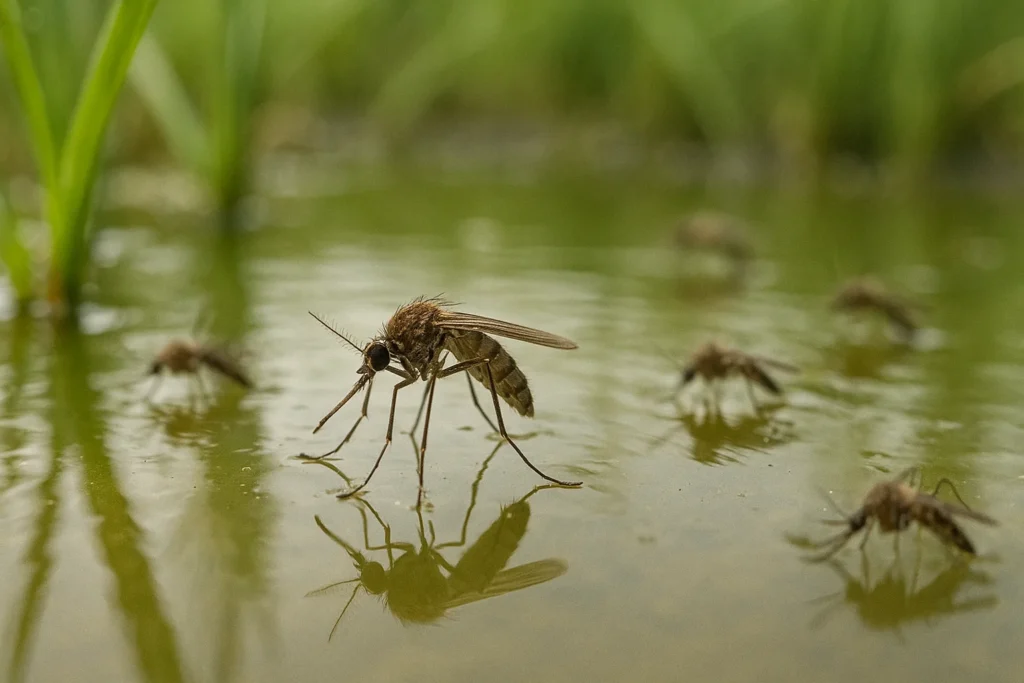
Mosquitoes in Alabama aren’t just annoying. They’re often misunderstood. Too many homeowners rely on advice that sounds right but makes mosquito problems worse.
If you’ve heard that citronella candles keep mosquitoes away or that bug zappers will fix your backyard issues, you’re not alone, but you might be feeding the problem instead of solving it.
Let’s clear the air on some common mosquito myths and what works to keep these biting pests at bay during peak mosquito season.
Key Takeaways
- Many “common sense” mosquito prevention tips in Alabama are based on myths.
- Female mosquitoes require standing water to lay eggs, even in small amounts.
- Citronella, bug zappers, and certain repellents often don’t offer reliable protection.
- Professional mosquito control is the most effective way to protect your yard throughout the entire summer.
Myth 1: All Mosquitoes Are the Same
One of the biggest mosquito myths in Alabama is that there’s just one kind of mosquito buzzing around your yard. In truth, there are several types of mosquitoes common here, including Aedes, Culex, and Anopheles. Each has different habits and risks.
Aedes mosquitoes, for example, are known carriers of the Zika virus, dengue fever, and chikungunya. They’re aggressive daytime biters. Culex species, on the other hand, are more active at night and are known vectors for West Nile virus and Eastern equine encephalitis.
Knowing the species of mosquito you’re dealing with helps target your mosquito control strategy more effectively.
Myth 2: Bug Zappers Help With Mosquito Control
Bug zappers may look like they’re getting the job done, but they’re not as useful as folks think. Research shows that zappers attract and kill only a minimal number of mosquitoes. Instead, they tend to eliminate harmless or even beneficial insects, such as moths and beetles.
Mosquitoes seek out carbon dioxide and body heat, not light. So, while your zapper is lighting up the night, female mosquitoes, the ones responsible for mosquito bites, are ignoring it and heading straight for you.
Myth 3: Citronella Candles and Plants Work Wonders
Citronella is one of the most overhyped mosquito repellents around. While it might smell nice on your porch, it doesn’t provide long-lasting protection, especially outdoors where wind can blow the scent away.
If you’re looking for effective repellents, choose those containing DEET or ingredients recommended by the CDC and EPA. Products containing DEET remain one of the most effective choices when used correctly.
Myth 4: Mosquitoes Only Breed in Swamps or Large Bodies of Water
You don’t need a swamp in your backyard to have a mosquito problem. Female mosquitoes only need a small amount of standing water to lay eggs. A clogged gutter, forgotten birdbath, or flower pot saucer can be enough.
Regularly dump water from places like:
- Birdbaths
- Flower pots
- Rain barrels
- Gutters
- Kids’ toys
Even something as small as a bottle cap can support the growth of mosquito larvae. Eliminating standing water is one of the most crucial steps in preventing mosquitoes.
Myth 5: Mosquitoes Die Off After a Few Weeks
Mosquito season in Alabama doesn’t end after one hot month. Mosquitoes can remain active from early spring to late fall, depending on the weather conditions.
The Alabama Department of Public Health (ADPH) warns that mosquito-borne diseases continue to be a concern throughout the season.
The mosquito life cycle moves fast. Eggs can become biting adults in as little as a week. Without proper mosquito control, populations can explode before you know it.
Myth 6: You’re Safe From Mosquito-Borne Diseases at Home
Many people think mosquito-borne diseases are a problem “somewhere else,” but West Nile virus and La Crosse encephalitis have both been reported in Alabama. The Centers for Disease Control and Prevention (CDC) advises taking steps to prevent bites, especially during peak season.
Wearing long sleeves, using proven insect repellents, and treating mosquito breeding grounds can help reduce your risk of diseases like dengue fever and Zika.
What Works?
For real results, take a layered approach to mosquito prevention:
- Eliminate all standing water weekly.
- Use insect repellents containing DEET or other ingredients recommended by the CDC.
- Wear light-colored clothing and long sleeves when possible.
- Install fans in outdoor areas, mosquitoes aren’t strong fliers.
- Schedule regular mosquito control treatments.
At Magic City Pest Control, our team treats yards across Birmingham, Huntsville, and surrounding areas to reduce mosquito populations and stop breeding in its tracks. We inspect each property and treat areas where mosquitoes lay eggs and rest during the day.
Don’t Let Mosquito Myths Keep You Inside
Believing the wrong things about mosquitoes can make your Alabama backyard a target. Don’t let outdated advice lead to more bites and bigger problems. If you’ve been lighting candles or plugging in zappers with no relief, it’s time to try a proven solution.
Magic City Pest Control can help reduce mosquito populations and prevent them from returning. Our team serves the greater Birmingham area and knows how to handle the pests that thrive in our local climate.
Ready to stop the scratching and enjoy your summer? Give us a call, and let’s protect your yard the right way.
FAQs
When does mosquito season start in Alabama?
It usually begins in March or April and lasts through October, depending on temperatures and rainfall.
What attracts mosquitoes to humans?
They’re drawn to carbon dioxide from breathing, body heat, and even your sweat.
Is DEET safe for kids?
Yes, DEET is considered safe when used according to label directions. The CDC and EPA support its use for effective mosquito prevention.
What is the best mosquito control in Alabama?
The most effective mosquito control in Alabama comes from working with a local pest control company that understands the region’s mosquito species and breeding habits. Professional treatments, combined with removing standing water and using proven repellents, provide long-lasting protection for your yard.

